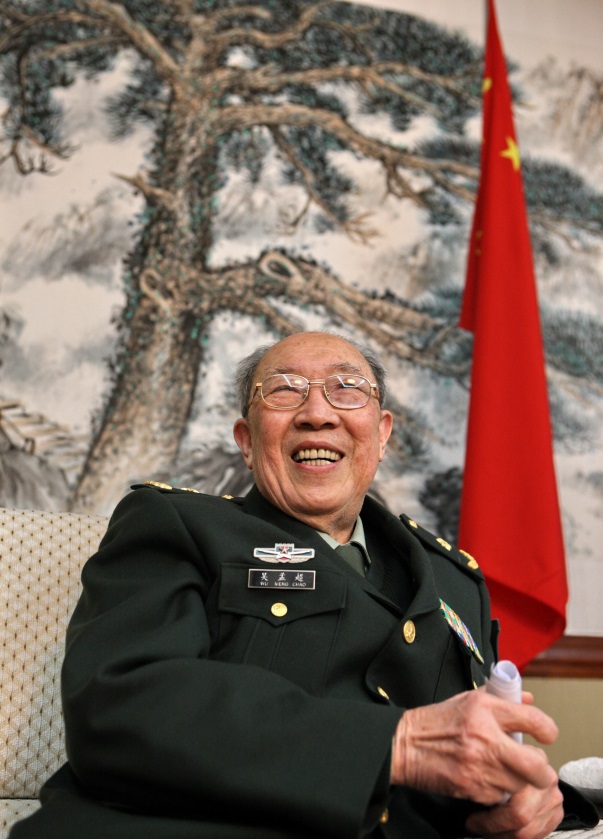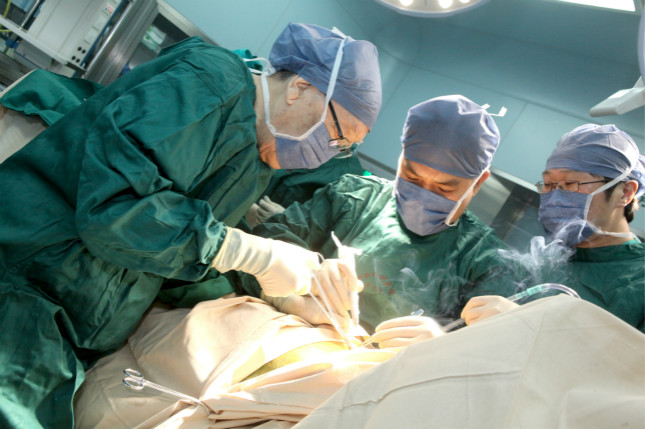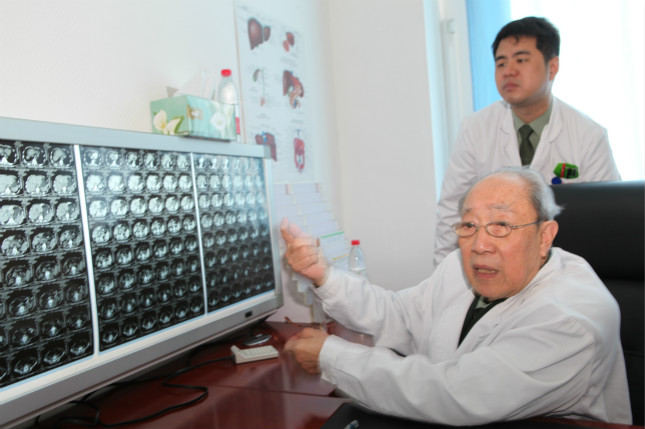97-year-old Wu Mengchao, who made breakthroughs in hepatobiliary surgery in China officially announced his retirement after 70 years of contribution in a ceremony held in Shanghai on Monday, according to Wenhui Daily.

Wu Mengchao sits before the national flag. (Photos: Wenhui Daily)
Working on treating patients with liver and gallbladder cancers by setting up theories and innovating surgical techniques, Wu, academician of the Chinese Academy Science (CAS) and director of Shanghai Eastern Hepatobiliary Hospital (SEHH), was quoted as saying that he had confidence and determination to “go into battle at any time” as long as he was needed by patients despite his retirement.
From zero to hero
Wu had operated on nearly 160,000 patients, spending most of his life easing their pain and sparing them from death. Years of holding the scalpel and standing before the operating table had left him with distorted fingers and toes. In the year before his retirement, he still insisted on participating in at least three surgeries every week.
To him, liver cancer was the biggest enemy while the operating room was a battlefield. “My biggest happiness is to die at the operating table someday,” Wu once said to Xinhua.
After graduating from Tongji University, a university known for its long history of medical instruction in Shanghai in 1949, he became a doctor and studied medical skills from Qiu Fazu, one of the pioneers of general surgery in China, who encouraged him to step into the undeveloped hepatobiliary surgery department.
He had decreased the surgical death rate to 0.30 percent and increased the survival rate after surgery of liver cancer to 56.1 percent and small liver cancer to 79.8 percent, according to Wenhui Daily.

Wu Mengchao operating on a patient.
Major breakthrough
Wu created distinctive theories and techniques in the field of hepatobiliary surgery after years of laboratory and clinical tests on innovative models, which laid a foundation for the development of Chinese hepatobiliary surgery.
Wu made the first casting of hepatic vessels in China which helped visualize the growth of hepatoma cells in scientific research and teaching in 1959.
In 1960, Wu performed hepatic resection for the middle lobe of the liver, which was the first in the world.
In 1975, Wu removed the biggest hepatic cavernous hemangioma of 18 kilograms from a Chinese farmer who suffered from his swelling tumor for eight years because there was no doctor willing to take the risk before Wu.

Wu Mengchao giving diagnosis.
Commitments to Research and Teaching
Believing that only performing operations would not eliminate cancer, Wu established the largest research institution for hepatobiliary surgery in the world and took the lead in a series of advanced research such as tumor vaccines and proliferative viral vector with anti-oncogenes.
In 2005, Wu was awarded “The Highest Science and Technology Award” with a prize of 6 million yuan ($887,000 million) for his outstanding contributions to medical science.
“All of my knowledge and honors are given by the Party and the army, but what I can return to my country and people is too little,” said Wu, according to Wenhui Daily.
Later, Wu donated the prize and believed that it could be better used by cultivating talent and rewarding medical workers who made great contributions. It is estimated that he had cultivated more than 1,000 professionals in the realm of surgery so far, according to Wenhui Daily.
Cover image: Wu Mengchao gives a salute.
(Compiled by Liu Jingshan)


